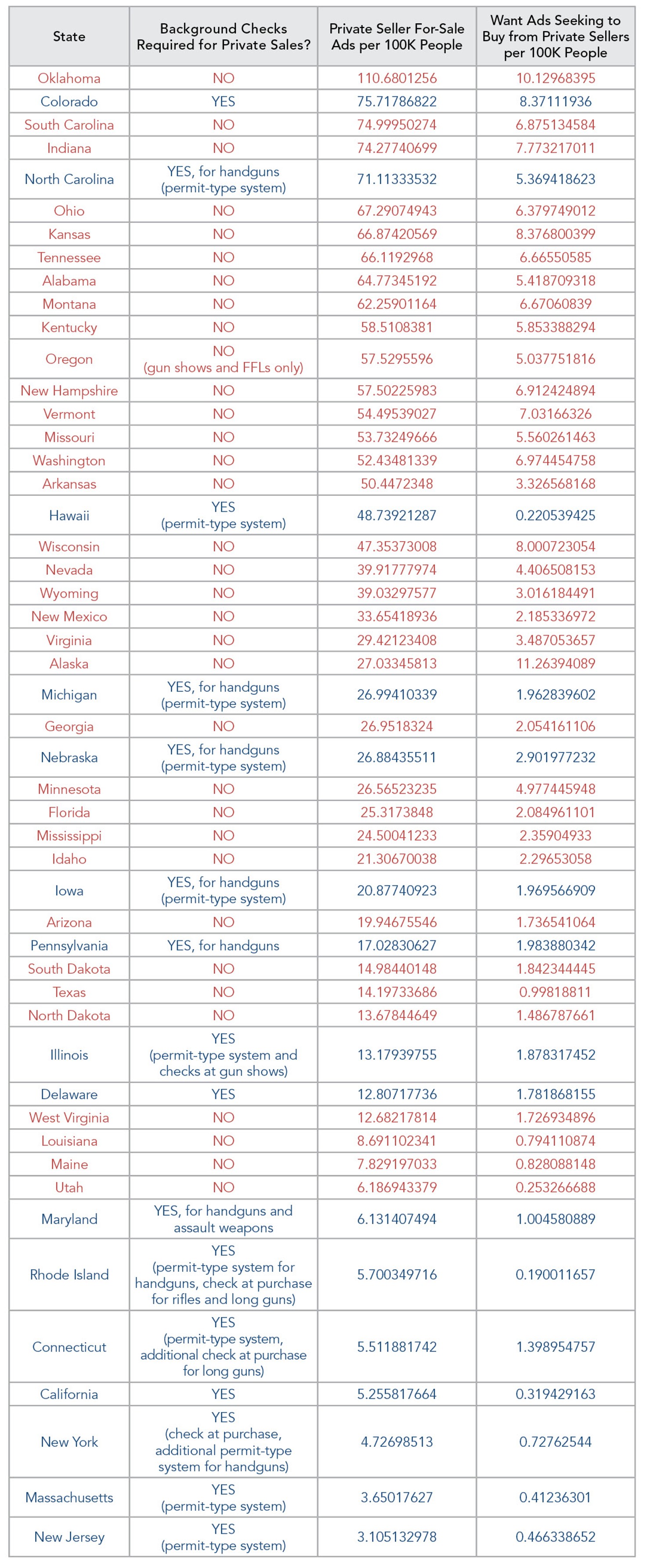Report Published September 24, 2013 · Updated September 24, 2013 · 9 minute read
What a Difference a Law Makes: Online Gun Sales in States With and Without Background Checks
Third Way & Americans for Responsible Solutions
It is estimated that today there are about 4,000 websites dedicated to facilitating gun sales between private individuals.1 One of the largest of these sites—Armslist.com—essentially serves as an eHarmony or Craigslist for gun sales, connecting gun buyers and sellers in each of the 50 states. Buyers can search for-sale listings or want ads within their state or city, locate unlicensed sellers or buyers, and arrange to meet up in person to purchase guns. As long as the gun doesn’t cross state lines or travel through the U.S. Postal System, 34 states allow these sales between strangers to take place unregulated and without criminal background checks. By contrast, 16 states require background checks for gun sales between private, unlicensed individuals like the stranger-to-stranger sales promoted on Armslist.com.*
In this study, we sought to determine if these laws make a difference. In particular, are there fewer online sales in states that require background checks compared to states that don’t? Based on our survey of more than 90,000 online firearm listings, we conclude that online private sales are far more prevalent in states that do not require criminal background checks than among states that do. We recommend that states and Congress enact laws to require checks for these private sales and that gun safety organizations encourage private sellers to always use background checks when selling their firearms.
* This includes states that require background checks at the point of purchase and states that require some type of permit to purchase a firearm, during the application process for which a background check is performed.
We analyzed every listing on Armslist.com, by state, on a single day in August. What we found is that state laws requiring background checks for private sales may significantly reduce the number of guns that change hands over the internet with no background check. States with expanded background check laws had both comparatively fewer for-sale listings posted by private sellers on the website and, significantly, far fewer want ads explicitly requesting to buy a gun from a private seller. In total, we found more than 90,000 for-sale listings posted by private sellers—almost 28,000 of which were for semiautomatic guns. Only a quarter (about 23,000) of the total 90,000 ads were listed in states that require background checks for private sales. The other 67,000 transactions won’t require any sort of background check to make sure a buyer is not a criminal, domestic abuser, or another kind of person otherwise prohibited from owning such a weapon.
Because states have widely different population sizes, we calculated the number of listings—both for-sale ads and want ads—per 100,000 people in every state, based on the 2010 census numbers. On a per capita basis, there are nearly twice as many online gun ads in states that don’t require background checks compared to states that do. The results for each state are listed in the appendix to this report. What we found illustrates just how effective laws requiring background checks for private sales really are—and how attractive the online loophole becomes in states that haven’t closed it for buyers who want to avoid (or know they can’t pass) those checks.
States With the Most Online Gun Sale Ads Don’t Require Checks
When adjusted for population, the data shows a significant difference between the extent of so-called “private” online firearms commerce in states where online buyers can evade a background check and states where checks are required for these sales just as they are for sales from licensed dealers.
- Of the 10 states with the most private listings on Armslist.com, 8 have no background checks on these sales—and one of the 2 that does is Colorado, whose law went into effect on July 1, 2013.
- The average number of for-sale listings by private sellers on Armslist.com (per 100,000 people) is 41.5 in states that don’t require background checks for private sales—twice the average in states that do (21.7).
Most For-Sale Ads by Private Sellers (Per 100,000 People)
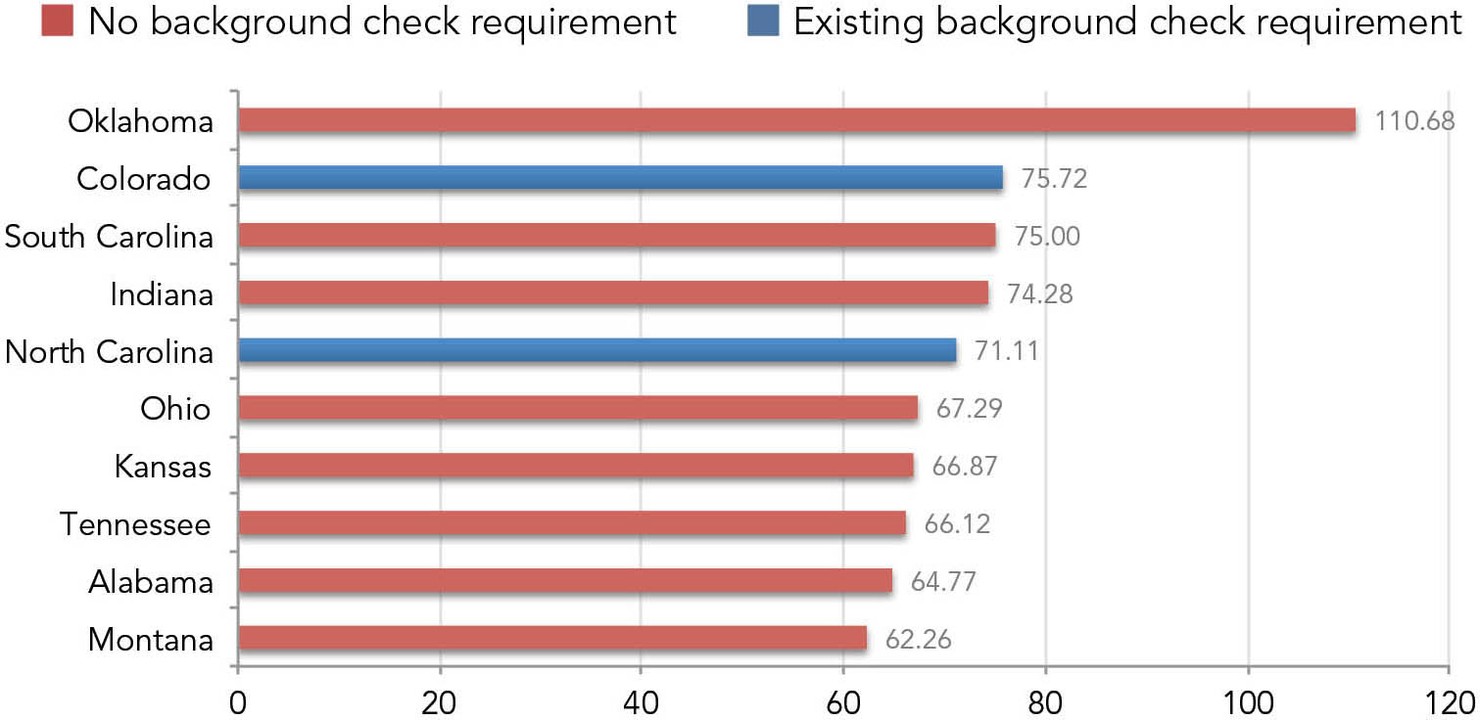
- Of the 20 states with the most private listings available on Armslist.com, 16 don’t have background checks on these sales. And in the top half of states, as ranked by number of for-sale ads, 20 out of the 25 have no law requiring background checks for private sales.
- On the other hand, of the 10 states with the fewest private listings, 7 do require background checks on these sales.
Fewest For-Sale Ads by Private Sellers (Per 100,000 People)
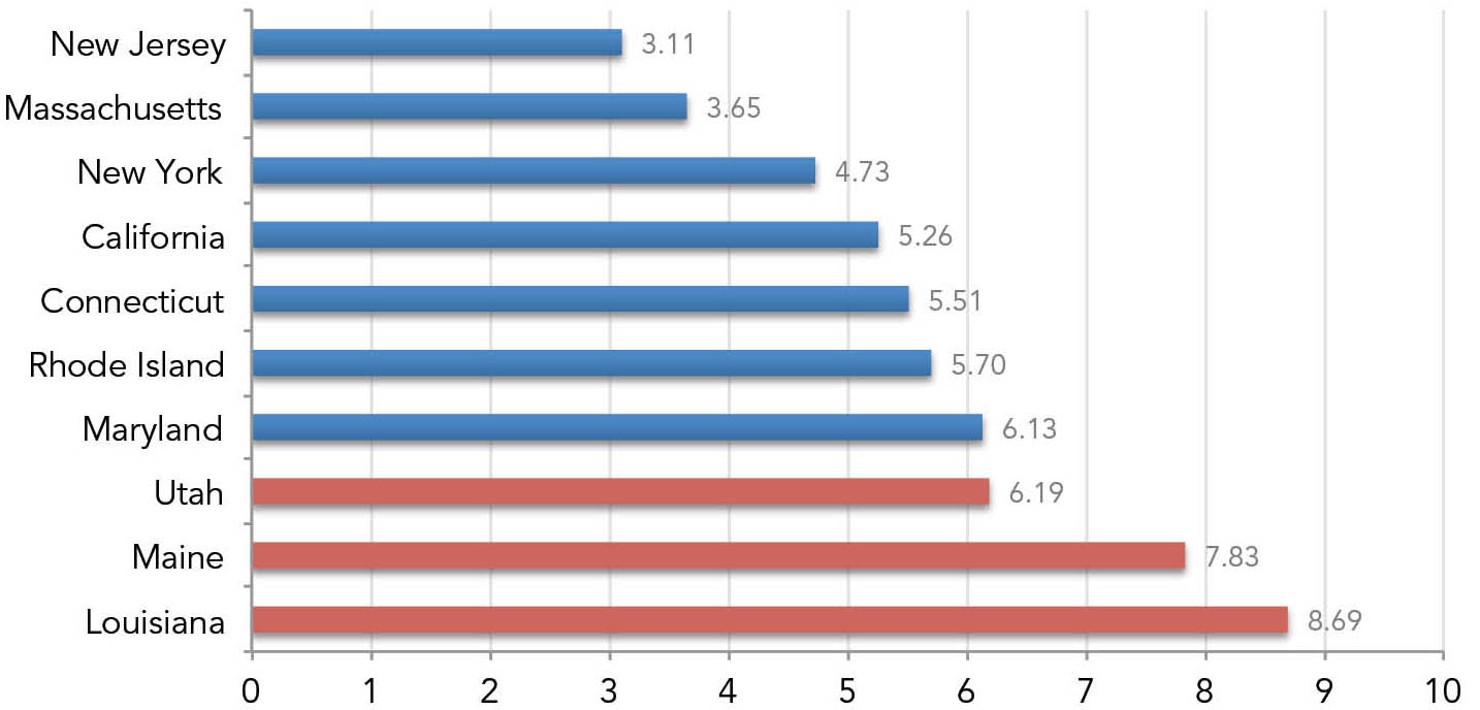
In States Without Background Checks, Thousands of Ads Appear to Search for a Loophole
Some want ads specifically request to purchase only from a private seller. Under federal law, these sales don’t require a background check. The seller does not need to verify the identity of the buyer, the buyer’s criminal history, or even the state in which the buyer lives even though selling across state lines is illegal. Arguably, the only reason someone would seek a private gun seller online (intentionally screening out online ads for the same guns from licensed dealers) is specifically to evade a background check. Tellingly, the number of ads seeking to buy a gun from a private seller plummets in states where those sales are subject to the same (or similar) background check requirement as they would be from a dealer.
- The average number of want ads specifically asking to buy from a private seller on Armslist.com (per 100,000 people) is 240% higher in states that don’t require background checks on those sales compared to states that do require checks on private, stranger-to-stranger sales (4.6 vs. 1.9).
- Of the 10 states with the most want ads seeking to buy from private sellers, 9 have no background checks on these sales. The only one that does is Colorado, and that law has only just gone into effect.
Most Want Ads Seeking to Buy From Private Sellers (Per 100,000 People)
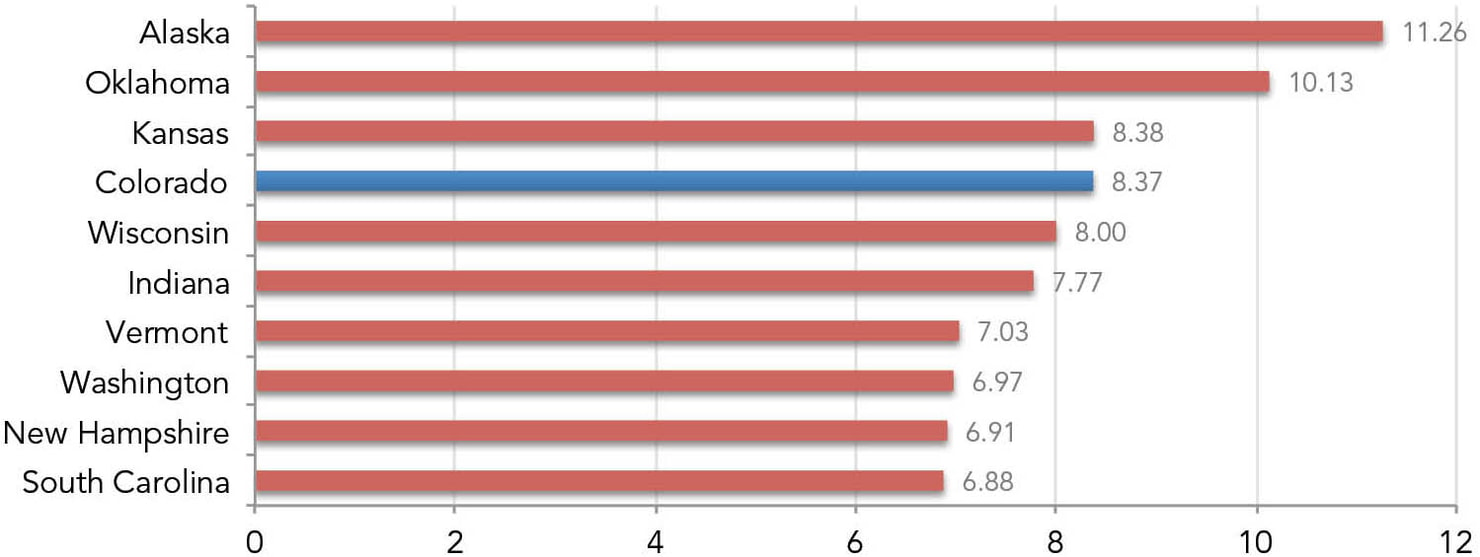
- Of the 20 states with the most want ads seeking to buy from private sellers, 17 have no background checks on these sales. And in the top half of states, as ranked by number of want ads, 21 out of the 25 have no background check requirement for private sales.
- In contrast, of the 10 states with the fewest want ads seeking to buy from private sellers, 6 have laws requiring background checks on these sales.
Fewest Want Ads Seeking to Buy from Private Sellers (Per 100,000 People)
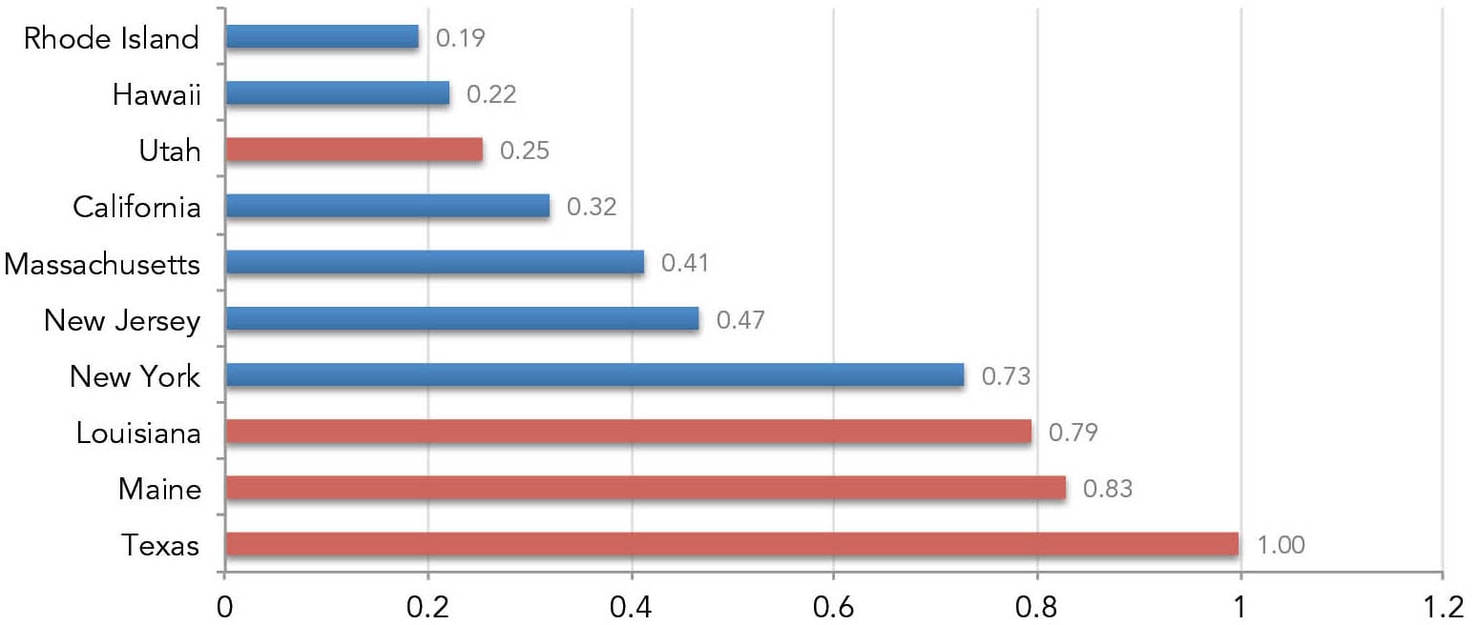
Background Checks Create Huge Differences in Comparable States
We also wanted to compare states of similar sizes, regions, and gun cultures to determine if like states with different laws have different patterns when it comes to online gun sales. We found major differences among sellers and seekers of firearms online in these states.
Ohio vs. Pennsylvania
- Ohio, which does not require background checks for private sales, has almost 4 times as many for-sale listings by private sellers on Armslist.com per 100,000 people as Pennsylvania, which does require background checks for private sales of handguns (67.3 vs. 17.0).
- And Pennsylvania has only one-third as many want ads seeking to buy from private sellers per 100,000 people, because unlike in Ohio, there is no incentive to target private sellers—any handgun sale will still have to go through a background check (2.0 vs. 6.4).
Virginia vs. Maryland
- Despite sharing a border, Virginia, with no background check law, has almost 5 times as many for-sale listings by private sellers per 100,000 people as Maryland, which does have a background check law for sales of both handguns and assault weapons (29.4 vs. 6.1).
- And Virginia has more than 3 times as many want ads requesting to purchase guns from private sellers per 100,000 people, compared to Maryland (3.5 vs. 1.0).
Indiana vs. Illinois
- Illinois, which requires all buyers in private sales to have passed a background check, has only one-fifth as many for-sale ads by private sellers per 100,000 people as Indiana, which does not require buyers to undergo a criminal background check (13.2 vs. 74.3).
- But Indiana has more than 4 times as many want ads seeking to buy from private sellers per 100,000 people as Illinois—likely because none of those sales will require background checks in that state (7.8 vs. 1.9).
Kansas vs. Iowa
- The number of for-sale ads by private sellers per 100,000 people in Kansas is 3 times the number in Iowa, which requires all handgun buyers to have passed a background check before purchase (66.9 vs. 20.9).
- And Iowa, with its stricter laws, has only one-quarter of the number of want ads seeking to purchase from private sellers per 100,000 people as Kansas—since in Iowa buyers would have already had to pass a background check (2.0 vs. 8.4).
Vermont vs. Massachusetts
- Despite both being small states in New England, Vermont and Massachusetts don’t have much in common when it comes to guns. Vermont, which has no background check requirement, has almost 15 times as many for-sale ads per 100,000 people as Massachusetts, which requires all gun buyers to have passed a background check (54.5 vs. 3.7).
- And Vermont has more than 17 times as many want ads targeted at private sellers per 100,000 people as Massachusetts, where buyers would have had to undergo a background check prior to the sale (7.0 vs. 0.4).
Conclusion
Background check laws make a difference. And since previous studies have shown that 9 out of 10 guns change hands before being recovered in a crime, they make a difference in reducing crime across America.2 So long as the 34 states without background check requirements for private sales don’t change their laws, this virtual loophole allowing ineligible buyers to skirt the criminal check system by purchasing guns from strangers they find online will continue to grow. The fact that online gun sales numbers are so much smaller in states that require background checks for private gun sales—both in raw numbers and as adjusted for population—just goes to show what a difference this law makes. Until the virtual loophole is closed for good, online gun sales between strangers, like those facilitated by Armslist.com, will continue to serve as an easy source of weapons for those people who know they can’t pass a background check. And while the loophole remains, it will continue to be harder for law enforcement to keep guns out of the hands of criminals, domestic abusers, and the mentally ill.
Appendix
